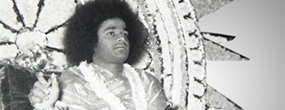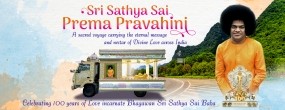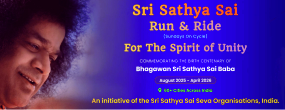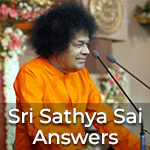
Discourse Date

Place
Brindavan

Occasion

Discourse Collection
Love Is God, Live In Love
It is out of the feeling of sacrifice that the nectarine sweetness arises in man. That sweetness is Divinity itself. Krishna is extolled as “Madhuradhipathe! madhuram! madhuram!” (Lord of Madhura, who is all sweetness). When the Lord is described as the “Master of Madhura,” what is this sweetness? The heart is sweet, the feeling is sweetness. The love (one feels) is sweet. The action (of the devotee) is sweet. The anandha (bliss) is sweet. The Atma is sweet. This blissfilled sweetness pervades man from head to foot. Unfortunately, man today makes no effort to recognise the sweetness that is in him. All his thoughts, feelings and desires are directed towards the external world. Not even a small fraction of it is turned towards the heart within. Bharatheeya culture contains illustrations of this sweetness. There is nothing in the world sweeter than the love of a mother for the child. For the well-being of the child the mother is ready to sacrifice her all, including her life. Such nectarine sweetness is manifest only in the mother who is the embodiment of the Divine. Hence, the Upanishathic injunction: “Mathru dhevo bhava!” (Esteem the mother as God). Likewise, the heart of the father who fosters the child, and develops his personality, is also sweet. The Upanishath, therefore, enjoins everyone to treat the father as God. Mother and father are equal to God.
Therefore, at the outset, one has to honour one’s parents. The mother is the visible manifestation of God. If ignoring the divinity of the mother, who is visible and adorable, one seeks to worship what is invisible, it must be regarded as a sign of ignorance. God is subtle form. He is invisible and is infinite and immeasurable. The mother is a visible and tangible proof of Divinity. When a child is born, the first person it beholds is the mother. The mother bears patiently many travails for the sake of the child. It is sweet to love such a mother. You may have love for God. But if you have no love for the mother who is physically present before you, how can you love the invisible Divine?
One's Foremost Obligation Is To Revere One's Parents
People tend to worship stones, but do not revere living beings. Worship of inanimate idols has been in vogue from ancient times. But people are forgetting to revere their living parents. One’s first and foremost obligation is to revere one’s parents who are in flesh and blood, who are verily your life itself.
In the Ramayana, there is the following illustration-Before leaving for the forest, Shri Rama approached his father, Dhasharatha, and said: “I am not sorry I have to go to the forest. Not does it pain me that you have given this command to me. I am to uphold your plighted word. Of what use is a son who does not uphold the word of his father? I derive the greatest sweetness from carrying out my father’s word of honour.” It follows from this that children should respect and carry out the words of parents. That alone testifies to the true quality of a son.
Life Acquires Sweetness When Parents Are Revered
Love is the primary source of sweetness for man. There is nothing greater in this world than love. Life acquires sweetness when one reveres one’s father and mother. Here is another example from the Ramayana.
Immediately after Rama broke Shiva’s bow, Emperor Janaka declared that he would offer Seetha in marriage to Rama. Janaka brought Seetha to the assembly hall. Rama, however, without any hesitation, but in sweet firm words, declared that he would not agree to the wedding without the approval of his parents. Rama said that he owed his body to his parents and that he would abide by their wishes. He declared that till his parents arrived (in Mithila) he would not even set his eyes on Seetha. ” I will consent to the marriage only after their approval.” In this manner, Rama rejoiced in setting an example to the world of ideal conduct for all to follow at all times. Sage Vishvamithra also waited for the arrival of Rama’s parents. In another episode in Ramayana, sage Vashishttha accompanied Bharatha to meet Rama in the forest. Intervening in the argument between Bharatha and Rama (over the issue of Rama’s return to Ayodhya to talc over the kingdom), Vashishttha said: “It is your right and duty to role over the kingdom. You are the eldest son of Dhasharatha. You are endowed with all the talents. You are well versed in the scriptures relating to Dharma (the code of Right Conduct). You have won the affections of the people. You are committed to the well-being of the people.” Vashishttha appealed in this manner to Rama to assume the reins of rulership. Speaking sweetly, eschewing harshness of any kind, Rama replied; “Guruji! Without honouring the plighted word of the father, if I disobey the command of my deceased father, I will be rendering my life worthless. My primary duty is to carry our my father’s injunctions. I may even transgress the command of the preceptor, but I will not go against the command of my father.” Thus, carrying our the commands of his father, Rama spent fourteen years in exile and demonstrated to the world the joy and fulfilment to be derived from such an exemplary life.
Qualities That Constitute Sweetness In Man
Human life should be sweetened by honouring one’s pledged word. Sweetness in life consists in setting an example in righteous living to those around one. There is sweetness in doing a good turn to one who has done you a good turn. Gratitude is sweet. These qualities constitute the madhuryam ( sweetness) in man. You should be grateful all your life to one who has helped you. You are the big man that you are today because of all the love and care bestowed on you in your early years by your parents. Therefore, to experience the love of your parents you should show your gratitude to them. This is a debt you owe to them.
Alas! in this Kali age children show no regard for the parents. This is the disastrous sign of modern rimes. In any circumstance you have to show respect and love your parents. You owe everything to them, from your flesh and blood, to the food you consume and the garments you wean. To remember with gratitude the parents who are no more is an act of sacrifice. It is a pity that people today are not aware of the supreme greatness of sacrifice. There is sacrifice in every aspect of life. The joy to be derived from sacrifice is incalculable. One has to learn the supreme value of sacrifice from one’s own parents who sacrifice so much for the sake of their children. It is your duty to keep your parents happy as long as they live.
The Four Types Of Human Beings
A Selfish Man Manifests His Animal Nature
“Jnanena shuunyah pashubhis samanah” (One who lacks wisdom is equal to an animal). Jnana is the capacity to discriminate between right and wrong, the permanent and the transient. Animality in man is indicated by the absence of this jnana. A real human being has to have this power of discrimination. He should know what to say, when and to whom, and he should know how to behave towards elders, towards friends and different kinds of people. A person who is ignorant in these matters is only an animal. Jnana, in its deeper sense, means Atma-Jnana (knowledge of the Self). This is absent in modern man. One who is selfish and self-centred is manifesting his animal nature. Only when self-interest is coupled with concern for others can one be truly human. Without manners one cannot be a man. Without good behaviour one is not a boy. Without discipline one cannot be a devotee. A previous speaker had said that the hand-kerchief lent beauty to Bhagavan Baba. This is absurd. The true nature of beauty was described by the poet Mallamma in Kannada. She said that to a pond the lotus lends beauty. The moon imparts beauty to the sky. For a devotee, the vibhuuthi on his forehead confers beauty. Without virtue, life ceases to be beautiful. Virtue implies conduct which evokes the approbation of others. It must be exemplary and confer delight on others. It should not cause harm to others or appear ludicrous. It should bring a good name.
Let Your Speech Be Always Sweet
No one who has trodden spiritual path, and engaged himself in the spiritual process has escaped calumny and cruelty. Mohammed, who sought to establish the primary of the One Formless Absolute, had a large share of persecution, defamation, and privation; Jesus, who attempted to rebuild mankind on the basis of Love, was crucified by little men who feared that their tiny towers of hate and greed will be toppled by his teaching. Harishchandhra, who had resolved never to waver from Truth, was submitted to ordeal after ordeal each more terrifying than the previous one.
– Sri Sathya Sai Baba











































